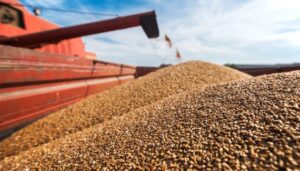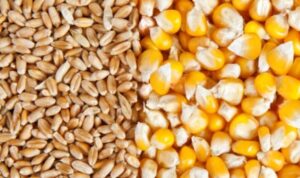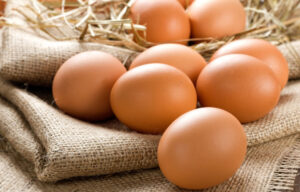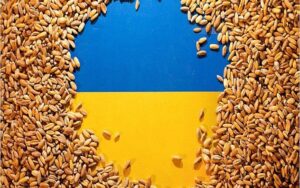
As of May 2, Ukraine had exported 35.341 million tons of grains and legumes since the beginning of the 2024-2025 marketing year (MY, July-June), of which 119,000 tons were shipped since the beginning of this month, according to the press service of the Ministry of Agrarian Policy of Ukraine, citing data from the State Customs Service.
According to the report, as of May 3 last year, total shipments were estimated at 41.607 million tons, including 242,000 tons in May.
At the same time, since the beginning of the current season, 13.913 million tons of wheat (15.848 million tons in 2023/24 MY) have been exported, 2.264 million tons of barley (2.205 million tons), 10.8 thousand tons of rye (1.2 thousand tons), and 18.644 million tons of corn (23.074 million tons). (1.2 thousand tons), and corn – 18.644 million tons (23.074 million tons).
Total exports of Ukrainian flour since the beginning of the season as of May 2 are estimated at 58.7 thousand tons (in 2023/24 MY – 87.1 thousand tons), including wheat flour – 54.5 thousand tons (82.4 thousand tons).

Ukraine has already exported 494,000 tons of sugar in the 2024-2025 marketing year, of which 196,600 tons were exported in January-April 2025, according to the press service of the National Association of Sugar Producers of Ukraine “Ukrtsukor” on Facebook.
According to the report, 90% was destined for the global market, with 10% exported to EU countries.
According to the industry association, Turkey remains the leading buyer of Ukrainian sugar, accounting for 16% of export volumes, followed by Libya (11%) and EU countries (10%).

Ukraine has exported 35.093 mln tonnes of grains and pulses since the beginning of 2024-2025 marketing year (MY, July-June) as of April 30, of which 2.269 mln tonnes were shipped since the beginning of the month, the press service of the Ministry of Agrarian Policy and Food reported, citing the State Customs Service.
According to the report, as of April 29 last year, the total shipments amounted to 40.711 million tons.
At the same time, since the beginning of the current season, Ukraine has exported 13.873 mln tonnes of wheat (15.55 mln tonnes in 2023/24 MY), 2.264 mln tonnes of barley (2.181 mln tonnes), 10.8 thsd tonnes of rye (1.2 thsd tonnes) and 18.437 mln tonnes of corn (22.502 mln tonnes).
The total export of Ukrainian flour since the beginning of the season as of April 30 is estimated at 58.4 thsd tonnes (86 thsd tonnes in 2023/24 MY), including 54.2 thsd tonnes of wheat (81.3 thsd tonnes).

The State Service of Ukraine for Food Safety and Consumer Protection has approved the form of an international certificate for the export of table eggs to Canada, the press service of the Union of Poultry Breeders of Ukraine reports.
“Please note that eggs can only be exported to Canada in cooperation with licensed importers in Canada, who must have a valid SFC (Safe Food for Canadians License),” the agency said.
The form of the certificate is available on the official web portal of the State Service of Ukraine on Food Safety and Consumer Protection in the section “International Cooperation” in the section “Certificates for export from Ukraine”.
The agency’s website also contains additional information on compliance with Canadian legislation by producers of table eggs and egg products, in particular on the storage and transportation of eggs and egg products, labeling of eggs and egg products, salmonellosis control program – egg products, salmonellosis control program – table eggs, requirements for egg sorting, and identification standards.

As of April 25, Ukraine had exported 34.74 million tons of grains and legumes since the beginning of the 2024-2025 marketing year (July-June), of which 1.916 million tons were shipped since the beginning of the current month, according to the press service of the Ministry of Agrarian Policy and Food, citing information from the State Customs Service.
According to the report, as of April 25 last year, total shipments amounted to 40.289 million tons.
At the same time, since the beginning of the current season, 13.714 million tons of wheat (15.404 million tons in 2023/2024 MY) have been exported, 2.258 million tons of barley (2.178 million tons), 10.8 thousand tons of rye (1.2 thousand tons), and 18.252 million tons of corn (22.231 million tons). (1.2 thousand tons), and corn – 18.252 million tons (22.231 million tons).
Total exports of Ukrainian flour since the beginning of the season as of April 25 are estimated at 58 thousand tons (in 2023/24 MY – 85.7 thousand tons), including wheat flour – 53.8 thousand tons (81 thousand tons).

In January-March 2025, imports of copper and copper products to Ukraine increased by 10.5% compared to the same period in 2024 to $46.42 million.
Exports of copper products increased by 17.7% to $21.35 million.
In March, imports amounted to $16.14 million, while exports amounted to $7.05 million.
For the whole of 2024, copper imports remained stable ($140.8 million), while exports increased by 22.4% to $88.24 million.
Copper is widely used in electrical engineering, pipe manufacturing, alloys, medicine and other industries.